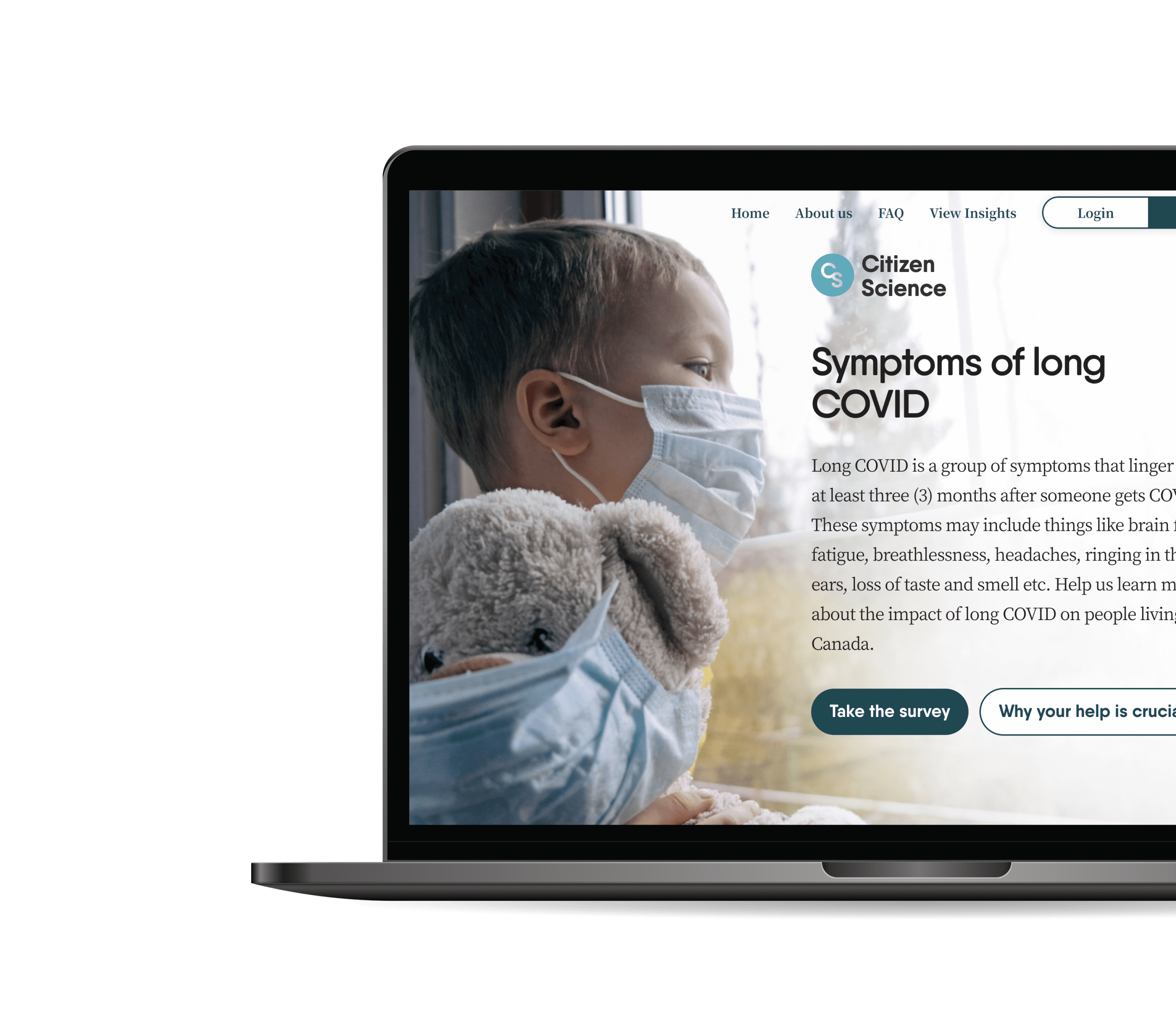Citizen Science: Long COVID
Exploring the effects of Long COVID
Citizen Science is a web-based platform to connect people living with long COVID and health scientists so that they can learn together about the impact of persistent impacts and use this information to guide research.
Platform

Recruiting people living with symptoms of long COVID to become Citizen Scientists to help solve the puzzling illness
In Canada, almost 15% of people who have had COVID reported experiencing symptoms at least three months after their COVID infection. While that translates to approximately 1.4 million Canadians, very little is known about the burden of these symptoms.
A team of researchers led by Dr. Linda Li set out to learn more about people’s experiences with long COVID to drive further research and enhance care. The research team collaborated with Tactica to find a way to democratize science through digital health technology and encourage the public to share their experiences to enhance understanding and form future research questions.
“People can feel overwhelmed and isolated. They may be uncertain as to whether symptoms are typical of others who are also living with long COVID. In addition, there are limited avenues to collect information from patients outside of clinics and analyze it to guide understanding of long COVID and inform potential healthcare management.” – Dr. Linda Li
A key challenge for the study was that it would not be conducted in a controlled environment, and would instead be entirely dependent on voluntary public contributions. The online platform would need to keep users’ attention and encourage them to complete the questionnaire or run the risk of losing important data points.
Connecting connect people living with long COVID and health scientists
Tactica developed Citizen Science, a web-based platform to connect people living with long COVID and health scientists so that they can learn together about the impact of long COVID and use this information to guide research.
The web app collects robust, flexible data through surveys that can be accessed by the general public. In-depth data collection includes standardized questionnaires, originally developed for patients referred to the Post-COVID 19 Recovery Clinics in British Columbia, about the health and life circumstances of visitors prior to and after contracting COVID-19. Understanding the importance of engaging users, Tactica structured the survey to present the most important questions first, breaking the questionnaire into segments that progressively add to the information captured.
This ensured the researchers would collect usable data even when participants did not complete the survey. Gamified elements and compelling visualization tools help maximize engagement and encourage participants to complete the full survey, however the most valuable factor in building engagement was the inclusion of patient partners in the design process. The long COVID portion of the platform was designed with the help of six patient partners, including four who live with long COVID. Tactica also worked closely with Population Data BC to provide a secure solution that met the stringent privacy requirements for collecting health data.
“No one knows more about it than the people who live with it,” says Dr. Linda Li.
Gathering more data through citizen science
To date, the Citizen Science website is the only one of its kind in Canada that collects this type of information about long COVID. The Long COVID Patient Experience Project is the second phase of a project funded by the BC SUPPORT Unit, which initially learned more about the impact of pain. The flexibility of the initial platform allowed for the opportunity for the platform to be expanded quickly and respond timely to the need for data around the long COVID experience. The robustness of the platform was an asset in enabling the research team to secure funding and conduct the second study, and the adaptability of the platform has gained interest from other researchers interested in leveraging the data collection portal to crowdsource data points for their own projects.
The platform is a partnership between the BC SUPPORT Unit, the Post-COVID-19 Interdisciplinary Clinical Care Network, Arthritis Research Canada, University of British Columbia, Simon Fraser University and Population Data BC. The development of the project was led by Dr. Li with support from Dr. Kim McGrail (scientific director for Population Data BC and director of research at UBC Health) and from CHÉOS scientist Adeera Levin who leads the Post-COVID-19 Interdisciplinary Clinical Care Network (PCICCN). CHÉOS scientist Dr. Karen Tran, a research scholar with PC-ICCN, was instrumental in helping design the components of the site that will be used by researchers.


